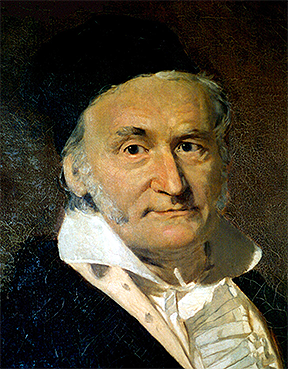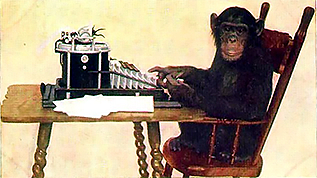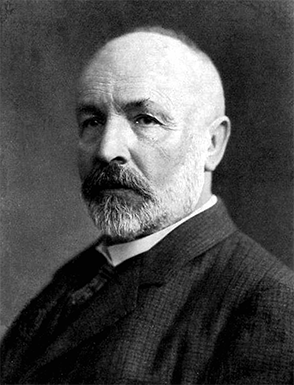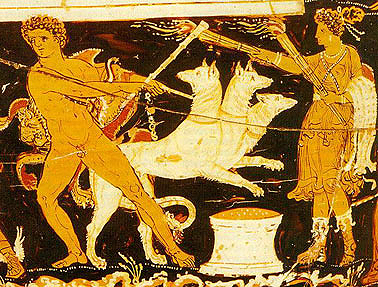Infinity Doesn't Exist
18/07/2015
In the mathematical community I hold a belief which is considered somewhat unorthodox. This is the belief that infinity does not exist. I have discussed this with many smart people and almost all of them (likely including you) are surprised at such a weird belief. There are many questions for someone who does not believe in infinity - What is the largest number? Can't I just keep adding one? What does it even mean for infinity not to exist?
Axioms
Perhaps the most compelling reason to believe that infinity does exist comes from the Axioms of Mathematics, namely the Axiom of Infinity which in plain English states "Mathematical objects infinite in size, exist".
So if you believe this axiom there really is no refuting that infinity exists. It is stated as a fact up front. Like the laws of physics, mathematical axioms govern and shape the mathematical world. But unlike the laws of physics mathematical axioms can be picked by mathematicians to construct a mathematical world that is the most beautiful or interesting. Axioms are also chosen based on no previous grounds, so the idea of infinity's existence in mathematical terms really is a belief in the purest sense - there is no reasoning behind it - and, according to modern maths, before you can even begin to perform mathematics you must already have decided for yourself if infinity exists or not. It is not something mathematics can tell you in itself. So what I mean when I say I don't believe infinity exists is that I don't believe infinity should have any place in the axioms of mathematics.

When I discovered infinity was in the axioms of mathematics it seemed a little odd. It was certainly not how things appeared when I was taught mathematics at school. When I was taught mathematics infinity was considered as provable as 1 + 1 = 2, and it was proven to us by our teachers using the fact that given any number, it was always possible to create a new number by adding one.
But confusingly there is no proof that infinity exists. It is an axiom, which means it is assumed - and this puts it on shaky ground. It means some human person decided upon this axiom using non-mathematical means. It makes you wonder why this individual made this choice and if you, under the same circumstances or different, would have done the same.
Many mathematicians did not do the same. Famous mathematicians such as L. E. J. Brouwer, Per Martin-Löf, Errett Bishop, Ludwig Wittgenstein, Henri Poincaré, Carl Friedrich Gauss and Leopold Kronecker didn't believe infinity existed. Many others such as Bertrand Russell doubted the existence of infinity in various forms and fought against the axioms of the mainstream mathematical community which were in flux at that time. Once, the existence of infinity was one of the biggest debates in the mathematical community.
But now the idea that infinity might not exist is pretty radical. Sad - because one of the best thing to learn about infinity is that believing in it is a choice - a choice that has been made differently by many different interesting and thoughtful people. And, like all the best bits of maths, thinking about the consequences of such a fundamental choice can be pretty fun.
An Infinite Universe
But for now let us assume infinity does exists. Why would we ever be unhappy with this idea? The finite mathematical world is a subset of the infinite mathematical world, so why not have both?
Well, some of the consequences of a belief in infinity, even just a mathematical infinity, can be quite startling. The properties of an infinite world are often quite unexpected, and can have serious effects on the finite world.

To give you an intuitition into the problems of infinity, let us imagine we believed that the universe was infinite. Because this universe is so large, (given a quantum probablistic universe) the chance of some configuration of atoms existing somewhere in this universe (providing it does not break the laws of physics) becomes certain. This means anything that could exist somehow within the rules of physics must exist somewhere in the universe. Often this property of infinity is posed using the Infinite monkey theorem.
This infinite universe includes all number of absurd things. An infinite universe means there exists somewhere in space an exact clone of earth but where everyone has three legs. It means there exists a clone of earth where everything is identical but that I have one fewer atoms in my right hand. It means all the scenes from Star Wars (at least the physically correct bits) are going on right now somewhere in the universe. Not just this - it means this earth with three legged people must exist an infinite number of times. In an infinite universe every possible subset and combination of atoms exists in an infinite number of places. In an infinite universe there exists an infinite number of earth clones with Hitler still alive, and making a simple living running My Little Pony conventions.
If you believe in an infinite universe you believe all of these things exist with certainty - the same certainty with which you believe that tomorrow will be Tuesday.
And, for similar reasons, the universe should be finite in time also. A universe that is fixed in space constrains events to a certain maximum size but anything that is possible within that universe space will happen at some point. It is a less extreme than thinking about these things happening right now, but ultimately it is the same. The issue is that it is still very unscientific to be certain that something will happen at some point in the future without evidence.
The problem with the infinite universe is that it doesn't behave like something that is really big. It crushes and twists many of the normal properties we expect from the finite universe we can observe until everything is equally, infinitely likely. In an infinite universe everything is in some sense the same, interchangeable, meaningless.
Physicists are naturally fairly conservative people when it comes to belief. They require evidence and experimentation before they say they believe something - so you can see why the theory of an infinite universe has not gained much support.
But all of this has been about physics - in mathematics we aren't limited by what is real. We don't need to believe things based upon evidence or experience, so isn't all of this hyperbole about infinite universes pointless?

Well, yes - sort of.
But the real world and the mathematical world are not so different. The mathematical world still exists, just in a more abstract way - in our imagination. In both worlds we have things we use often and are familiar to us and in both worlds we have the rest of the universe about which we are uncertain. We don't know how large it is, what it might contain, what it looks like.
But if you believe in an infinite mathematical world you believe with certainty that lots of weird or absurd mathematical things exist - things you've never used, encountered, or can even describe. It flattens the shape of the universe, and devalues the finite things we have knowledge about. What is a proof about a single number worth in comparison to a proof about all numbers? In an infinite mathematical world - nothing.
Keep Adding One
The obvious argument for infinity existing is that, given some number, it is always possible to add one to get a new number. Therefore there must be an infinite number of numbers.
The problem with this argument is that it presupposes infinity exists already. More specifically it assumes that a process can be repeated an infinite number of times. If you can't repeat a process infinitely, and there isn't infinite time, it isn't possible to continue adding one forever.
People are often acutely aware of how finite space is. We struggle to imagine putting an infinite number of apples into a bag, but if we translate it to time, and instead talk about the idea of eating apples repeatedly forever, it becomes much easier to imagine. This is why this argument is effective.
So when people say that infinity exists because they can keep adding one, what they really mean is that infinity exists, given infinite time or given infinite space or given an infinite counting speed.
If we presuppose the opposite - that infinite time doesn't exist - we can easily apply the same argument in reverse. We can say that, if there is some time limit, I can't keep adding one, and so infinity must not exist!
This is the odd thing about many mathematical objects with respect to infinity. It doesn't matter if we assume infinity exists or not - the object still behaves consistently. Somehow infinity transcends things like numbers or equations or geometry. It is a more fundamental choice - and this is why it is axiomic.
Mathematical Lamps

The odd behaviour of infinity isn't limited to a physical universe. Infinity can behave oddly in a purely mathematical universe too. A good example is given by the thought experiment Thomson's Lamp.
The setup is this - let us imagine a lamp with a switch that flicked once, turns the lamp on, and flicked again turns it off. Now suppose we can perform the following task: after one minute we turn the lamp on, then half a minute after that we turn it off, then a quarter of a minute after that we turn it on again, then an eighth of a minute after that we turn it off, and so on...
The sum of this infinite series of intervals is two minutes. The question is, given that the lamp can only be on or off, what state is it in after two minutes?
This problem can be modelled by Grandi's series, I.E the infinite sum of the series +1, -1, +1, -1, where adding one represents switching the lamp on and subtracting represents switching it off. If the lamp is on in the final state then the sum of this sequence should be 1, if it is off, the sum should be 0.
S = 1 - 1 + 1 - 1 + 1 - 1 ...But depending on how we manipulate this equation we can get three different
answers. If we place the parenthesis between each consecutive pair we can
construct a series that cancels itself out and equals 0.
S = (1 - 1) + (1 - 1) + (1 - 1) + ... = 0Or if we place the parenthesis offset by one we can make a series that equals
1.
S = 1 + (- 1 + 1) + (- 1 + 1) + (-1 + 1) + ... = 1Or, if we can solve for 1 - S we can find that S = 1/2.
1 - S = 1 - (1 - 1 + 1 - 1 + 1 - 1 ...)
1 - S = 1 - 1 + 1 - 1 + 1 - 1 + 1 ...
1 - S = S
2S = 1
S = 1/2
We can make S equal to 1, 0, or 1/2.
However we look at the situation, it seems that somehow the lamp is somehow both on and off at the same time. But this is a contradiction to our previous statements that the lamp must be either on or off.
In mathematics, when we come to a contradiction often the first thing to do is check our prepositions are correct. Are all the things we assumed to be true in the first place really true? In the case of Thomson's Lamp one of them must be wrong. Modern mathematics says that the proposition that says the lamp must be either on or off is wrong. In infinite mathematics lamps must be able to be both on and off at the same time.
But you could say instead that infinity doesn't exist - that it isn't possible to perform an infinite series of actions. That even a mathematical lamp can't be on and off at the same time. We could try this experiment in real life and get a similar answer. Eventually we would only be able to switch the lamp at the smallest observable quanta of time - we wouldn't be able to switch it any faster. And so the lamp would have a definite ending state after two minutes - and even one we could calculate beforehand if we knew the numbers involved.
Thompson's Lamp is just one example, but there are hundreds of these paradoxes in mathematics not least of which Russell's Paradox, where unintuitive behaviour is chosen rather than disbelief in infinity. It simply isn't true to say belief in an infinite mathematical world doesn't affect the finite mathematical world. One effect is shown here - in an infinite mathematical world, finite mathematical objects such as lamps have an extra weird property - they can be on and off at the same time.
The Biggest Number
If there is no such thing as infinity, and there are a finite amount of numbers, then what is the biggest number? Good question. We could pose the same question to a physicist - if the universe is finite, and there are a fixed number of atoms, then what is at (or beyond) the boundary?
A physicist would probably say that because the boundary is always growing no one really knows. The universe is expanding at the speed of light - which makes observation impossible. In the case of mathematics, mathematicians who don't believe in infinity hold a similar idea - that the mathematical universe is being constructed on-the-fly. At the rate it is being observed. These people are called Constructivists.
Constructivists believe that rather than mathematics just existing and being discovered, it only exists once it has been observed, and it is the act of observation that brings it into creation. More precisely, Constructivists believe that a mathematical object only exists once it has been defined, created, used, or constructed by someone, and before this, it doesn't exist.

So the edge of the mathematical universe is like the edge of the observed universe - and in one sense the biggest number is like the boundary of the universe - the biggest number that has been observed by anyone.
This is similar to the modern view in physics - which states an object can only exist if it has some meaningful interaction with the universe and that the act of observing something allows you to believe it exists. If some supernatural being has no observable effect on the universe then it cannot be measured, and it is impossible to prove either its existence or non-existence. By convention (or Occam's Razor) we say that these things with no interaction don't exist.
You can imagine this a little like a procedural world such as in Minecraft. Moving to the boundaries of the world generates new parts of the world to see and explore, but at any point the observed world is still finite - and no matter how fast your explore (unless you explore at an infinite speed, or for an infinite amount of time, or over an infinite distance etc) it will always remain finite, however infinite it appears.
This is often described as potential infinity and it means a system has the potential to be infinite if infinity were to exist. This is in contrast to actual infinity - which is the belief of modern mathematics, and is a system which exists infinitely all at once.
So the biggest number depends on what exactly you're asking. If you're asking what the biggest observed number is - it is exactly that. If you are asking what potentially is the biggest number, what is beyond the bounds of the universe, unlike mathematicians that believe in infinity - I can only tell you how to get there, not what it actually is.
The Real Numbers
In classical mathematics we learn that there is not just one infinity, in fact there are several, and some are bigger than others!
The main two infinities are the so called Natural Numbers - which means every integer number
0, 1, 2, 3, 4, 5, 6, ...And the Real Numbers - which means every decimal number, including every decimal expansion, including those which expand infinitely. Here are a few examples of ones with finite length expansions
1.1
12.812213123
3434.3161369845983724071035832058320985
5.0
but remember I also mean all the ones with infinite expansions where the expansion follows no meaningful pattern.
The natural numbers and the real numbers have some different interesting properties. For example I can always write down a natural number. It might be really long and take page and pages but it should be possible to write it down. For this reason I can also always communicate a natural number to someone.
The natural numbers allow us to count objects by pairing each one with something else. For example if we had a pile of rocks we could put aside one for each natural number, and when we were done this would tell us how many rocks we had. For this reason sometimes they are called the countable numbers.
But there is no way to pair the natural numbers with the real numbers. There are simply more real numbers than there are natural numbers. Any time we find a pairing that might work, it is possible to create a new real number which was not paired. This is called Cantor's Diagonal argument and is why the real numbers are considered a larger infinity.
Consider the real numbers which have an infinite decimal expansion but where the expansion follows no pattern. It is impossible to talk about a specific one of these numbers. They are completely impossible to express. Okay so a few we can talk about such as pi and the square root of 2, but most of them just follow no pattern, have no properties, and go on infinitely. This makes them impossible to communicate. In fact nothing can be done with these numbers. Because they can't be expressed they can't even be used in mathematics.
The vast majority of real numbers are like this. The only ones that aren't are those that correspond to the natural numbers. The set of real numbers is somehow padded out with all these indescribable and fundamentally useless elements - and so many of them that in proportion it appears the set is completely full of these indescribable numbers.
The question is, do these indescribable numbers, which have no interaction individually with the rest of the mathematical universe, and only exist due to the axiom of infinity, really exist?
Infinity is Useful
One worry about dropping the concept of infinity from mathematics is that many theories of mathematics rely on infinity in one form or other. Calculus is often the first topic that comes to mind. If we remove infinity from mathematics wont we lose a lot of it's usefulness? Will we be unable to integrate, differentiate, calculate areas and boundaries? Will we be able to use Turing Machines in computer science? Could we still calculate the area of a circle?
As it turns out almost all useful forms of infinity in mathematics can be modelled perfectly well by potential infinities. A great example of this is limits, which (in a finite mathematical world) are like function with a promise - given some infinite resource - they would eventually calculate some value.

In a finite mathematical world a limit never actually calculates the value it expresses - it can only be used to find approximations of it - but this doesn't matter. Thanks to the greatness of algebra we can still find rules and ways to manipulate these objects in symbolic form without computing anything infinitely. Sums with infinite terms don't actually have to be resolved. Things like integration can be performed with just a few switches and modifications of symbols. If anything Calculus is a shining example of finitist mathematics! Unless you actually believe that when performing symbolic integration you are calculating an infinite number of additions in your head...
We can also consider the value of pi. In an infinite mathematical world actual pi - the full decimal expansion of pi - is said to exist. But is this really necessary? Everywhere we use the symbol pi it is equally adequate to instead talk about pi defined in limit form - a finite form. What is the usefulness of pi existing in full decimal expansion form?
So what can't be done if we remove infinity from the axioms? Well we can't talk about things such as the Real Numbers that follow no pattern infinitely - we can't describe a turing machine which prints to the tape without following any pattern and goes on forever. We can't use actual infinities. But we also can't talk about sets of these things - and this is the main issue for many mathematicians. We can't talk about sets of things where each thing can't be described individually.
Now this might be an issue for some, but it certainly isn't a problem for useful mathematics. Some would say that this subset exactly describes useful mathematics - because finite mathematics is the only expressible mathematics.
Cantor's Paradise
If infinity makes the mathematical world act so weirdly, why was it chosen as an axiom in the first place?

Well, the concept of infinity had always sat in a troubled place in mathematics until Georg Cantor developed the mathematics required to use and understand it. Much of his work was considered incredible, beautiful and profound - it gave clarity to many of the questions of infinity. Cantor's theories were undeniable beautiful and vast. They described stacks of infinities of infinities - each one larger and more transcendent than the last - interacting and wrapping around each other, twisting and curling into infinite areas like fractals, or unwrapping into a vastness unimaginable. Cantor created a kind of mathematics seemingly so fundamental, so deep, that many felt certain it touched on the real roots of mathematics - that it must be ground for development of the axioms of mathematics.
And this is what happened. David Hilbert and many more forged forward to build mathematics on axioms based around set theory. The mathematicians, enthused by Cantor's world, built the axioms in the spirit of Cantor's original work. There was no question that infinite sets existed. As David Hilbert was famous for saying - "No one shall expel us from the Paradise that Cantor has created".
There was less potential for opposition. The science of the day didn't have quantum theory. Most scientists probably believed that space was a continuum - that a space could be divided into infinitesimally smaller sections forever. When Cantor was writing the atom hadn't been discovered. The cosmology we have today didn't exist either. Time and space may as well have been infinite to scientists of the day - there was no reason to believe otherwise. And of course there were no computers. When Cantor was writing the world looked a lot more infinite and the arguments of the Constructivists seemed to fall flat. Constructivists appeared conservative - old fashioned - and resentful that so many of the mathematical community had followed Cantor.
But science and beauty weren't the only reasons for infinity. There was a final, surprising reason - God. Cantor was a devout Lutheran and believe that the theories he'd discovered had been communicated to him by God. He equated actual infinity directly with the concept of God. Well - they have many similarities - both are transcendental concepts that defy imagination and (according to many) must exist. Both go beyond imagination and seem to exist in some kind of beautiful unimaginable realm. Even for the other mathematicians (who may not have been religious) the presence of a kind of "God" in mathematics was desirable. Actual Infinity was the mathematical concept that lifted mathematics above the plane of everyday life - brought it above humanity and imagination - and made it somehow a deeper study, not of nature, but of something grander. This idea, they felt, no matter what the paradoxes and oddities, was worth fighting for.
Maths Imitates Life
I remember learning about infinity at school. It was a pretty hard concept to grasp. Each child seemed to have their own way to explain it. Some said it was the biggest number, bigger than all the other numbers. Some said it was everything - it was the whole universe. Others said it was all the numbers somehow joined together into one. And some said it was god - it was a symbol for all that was unfathomable and unexplained. No one had a real solid idea of what it was. Even communicating infinity was hard - trying to describe infinity to your friends and they gave you blank looks. It was only until a few people started talking about infinity that it became possible to descibe, and even then it was best described as "That thing Robert was talking about which is really big."

In the end most of us only learn what infinity is by reference - we learn that when people say infinity what they mean is that concept which everyone talks about. To talk about infinity now is to talk about the mathematical topic of infinity.
The problem is that Infinity can't be constructed from smaller things we are familiar with. When we describe things in terms of things we already know we can understand them, imagine them, explore them. A dog with three heads, or even something like a cube in twenty dimensions. Humans are very capable of combining objects and properties and understanding the consequences of doing so providing each property and object is clear.
But we can't do otherwise. We can't imagine a creature that isn't somehow combined of other parts we already know. We can't imagine a new color we've never seen before and isn't a blend of the existing colors. We can't have a completely original thought that doesn't combine and compose other ideas.
Additionally we can't define things by properties they don't have when we've only experienced objects with that property. We can't say that we are imagining "a sphere which is not round", because all the spheres we have ever encountered are round. We imagine crude approximations instead - spheres deformed into cube like shapes - but these are never correct. Infinity is no different - we can't really say that infinity is defined as anything that is not finite because we've never experienced anything that is not finite. Instead we imagine the same crude approximations - a finite set with ellipses at the end, or hundreds of numbers going off into the horizon.
There are no building blocks for infinity. It can't be defined in terms of the natural universe because infinity doesn't exist in physics. We can build seemingly close approximations but they repeatedly trick us because they don't have the properties we expect. Thompson's lamp can't really be half on and half off. Achilles in Zeno's Paradoxes can't really move at infinitesimally small distances. We can't really add one forever and ever. Infinity just doesn't exist in the natural world and so all of our approximations fail.
As much as we like to pretend that mathematics is a separate universe from the real world - the truth is that mathematics, like all things, imitates life. Like all things, mathematics is human, and is built of human concepts, and it is impossible for humans to imagine things without combining constituent parts and properties of other objects they know and understand. Infinity is no different. But for infinity we can't find the parts we need - not even in other areas of mathematics. These parts simply don't exist.
This is ultimately why I believe infinity should not be an axiom of mathematics. It cannot be imagined - and it is not right to declare something exists which cannot be imaginable - not even in mathematics. If you say you believe in infinity, say you understand it, say you can manipulate it and do mathematics with it - it isn't true. It can't be imagined, it can't be realized, it can't be used in mathematics - only finite approximations can. You cannot imagine infinity, use infinity, describe, or realized infinity. If you could - it would be finite. Not only does infinity not exist - I think it cannot exist - not in the real world - not in imagination - not in mathematics.
If you have any questions, objections, comments please feel free to e-mail me about them. If you're still interested in the topic consider reading some of the following links. Or you can check out this essay by N J Wildberger one of the most controversial modern finitist mathematicians.
- Mathematical Axioms
- Axiom of Infinity
- Thomson's Lamp
- Axiom
- L. E. J. Brouwer
- Per Martin Lof
- Errett Bishop
- Ludwig Wittgenstein
- Henri Poincaré
- Carl Friedrich Gauss
- Leopold Kronecker
- Bertrand Russell
- Infinite Monkey Theorem
- The Absurdity of Infinity
- Zeno's Paradoxes
- Russell's Paradox
- The Banach–Tarski Paradox
- Constructivism
- Occam's Razor
- Actual Infinity
- Natural Number
- Real Number
- Cantor's Diagonal Argument
- One minus one plus one minus one - Numberphile
- Grandi's Series
- Proof some infinities are bigger than other infinities
- How many kinds of infinity are there?
- Set Theory: Should You Believe?
- Intuitionistic logic
- Finitism
- The Existence of Irrational Numbers
- The Evolution of the Real Numbers
- Are the Real Numbers really Numbers?
- Is a line really composed of Points?
- Pi
- Leibniz formula for Pi
- David Hilbert
- Georg Cantor
- Does Infinity Exist?
- "The Color Munifni Exists"